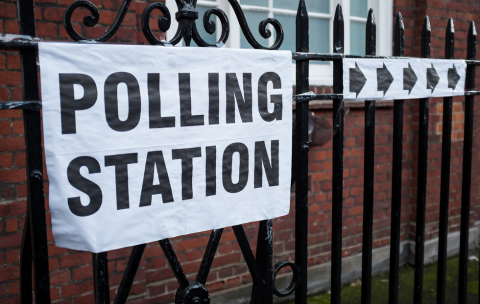Economic Update
Stay informed about the latest economic developments in the UK, Eurozone and the US. Get insights into key indicators and currency trends in this comprehensive economic update blog.

Political Earthquake: Rishi Sunak's snap election call stirs speculation
8 minute read28 May 2024
GBP
The most significant news in the UK last week was Rishi Sunak's unexpected move to call a snap election on 4th July. Speculation that the election would happen in the autumn meant the announcement caught many by surprise, sparking a wave of curiosity about the underlying reasons.
The first potential answer could be related to the inflation data released the day before. Sunak pledged to halve inflation in the first year he came to power, a target he narrowly reached at the end of 2023.
Although last week's data came in higher than expected at 2.3%, CPI inflation is now as close to the target of 2% as it has been since July 2021. The Bank of England's forecast that it would dip close to 2% before rising again, meaning that this could be the lowest it will get this year. The UK has also officially come out of the shallow recession the economy experienced at the end of last year.
With the economy's growth now expected to slow, the timing of the election is crucial. With positive economic news close to election day, it allows the Conservatives to leverage their economic accomplishments campaign. It is particularly poignant as Labour's policies have traditionally focused more on social equality than economic growth.
It also looks increasingly unlikely that the government will be able to offer any pre-election tax cuts. The International Monetary Fund has warned the UK government that it could be on course to miss its debt target and tax rises could be needed instead, which the Conservative party would be keen to avoid being held responsible for before the election is held.
Another critical contributor could be migration. Data has now confirmed that migration to the UK has peaked, with visa applications falling by a quarter across all key routes in the first four months of the year. Reducing migration has been a key pledge for the government, and this could form a central part of its campaign.
Despite the migration data and the positive economic news, polls indicate a potential historic defeat for the Conservatives against Labour. According to the BBC, 44% of the electoral population intend to vote Labour compared to 23% for Conservative, highlighting the uphill battle the Conservative party faces.
The Conservative party is also experiencing a substantial pre-election exodus, with 119 MPs announcing they will not stand again as of 4pm last Friday. Over the weekend, Rishi Sunak announced a National Service scheme for young people and a Triple Lock Pension Plus in a bid to attract potential Reform voters and the older generations back to the Conservatives.
This week is expected to be fairly quiet on the data front, although we continue to expect policy updates from all parties.
EUR
Last week, French, German, and Eurozone Manufacturing and Services PMI data were released. The French services sector contracted slightly, coming in at 49.4, down from 51.3 previously, and the gradually recovering manufacturing sector came in above market forecasts at 46.7.
In Germany, business activity rose for the second consecutive month. The services data exceeded forecasts, coming in at 53.9, while manufacturing posted 45.4 ahead of the expected figure of 43.5.
Looking at the Eurozone as a whole, it was reported that economic recovery gained momentum in May, marked by stronger business activity, new orders, and employment. Its manufacturing PMI data exceeded forecasts, coming in at 47.4, up from 45.7 previously, while the services sector data came in slightly below expectation at 53.3, marking no change from the previous month.
This week is fairly quiet, with German preliminary CPI inflation, the only data release of potential impact, released tomorrow. However, markets have all but priced in a rate cut at the European Central Bank’s policy meeting next week, so it's unlikely to have any significant repercussions on either market expectations or the euro.
When it meets next week, the ECB is projected to be the first major central bank to cut rates, which is expected to be the start of a change in monetary policy since accelerating inflation and subsequent interest rate rises led to the unprecedented run of tightening monetary policy that we've been seeing since Summer 2021.
USD
Last week, there was a run of public speeches from the Federal Reserve's Monetary Policy Committee members. The tone of the speeches followed a more hawkish trend, with the higher-for-longer narrative towards interest rates continuing. The CEO of the Reserve Bank of Atlanta, Raphael Bostic, said on Monday, “We're not past the worry point in terms of inflation getting back to our target,” before continuing to highlight the Fed was “not in a hurry to cut rates" and that they will "want to make sure that policy easing is unambiguous." during his speech on Tuesday.
Later in the week, the latest preliminary manufacturing and service readings were released. Both the Flash Manufacturing and Services PMIs came in above expectations, with the manufacturing figures pushing further into growth territory at 50.9, growing from 50.0 last month and ahead of the 50.0 expected. Services climbed to 54.8, significantly ahead of the 51.2 expected and the previous month’s reading of 51.3.
The US data schedule this week is relatively sparse. Preliminary quarterly GDP growth data will be released on Thursday, and the latest PCE Price Index, the Federal Reserve’s preferred measure of inflation, is due on Friday.
The latest GDP data will deliver the second estimate of the first quarter’s growth and is expected to be revised lower from 1.6% to 1.3%.
April’s PCE inflation data, which measures personal consumption expenditure prices, is expected to rise 0.3% for the third consecutive month on Friday. However, the Core PCE figure, which removes the volatile food and energy prices, is expected to have risen just 0.2%. This would mark the lowest acceleration this year.


